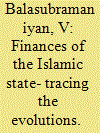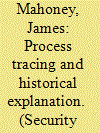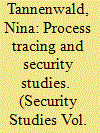| Srl | Item |
| 1 |
ID:
139663


|
|
|
| 2 |
ID:
140396


|
|
|
|
|
| Summary/Abstract |
This article offers a state of the art of methodological writings on process tracing. Its goal is to encourage the more self-conscious and transparent use of this method in security studies. The article considers process tracing for both theory testing and theory development. First, with theory testing, the article discusses the logic of historical explanation and the use of sequential analysis. It then focuses attention on two kinds of process-tracing tests: hoop tests and smoking gun tests. The article explores the mechanics through which these tests allow investigators to pass judgment on hypotheses. Second, with theory development, the article examines the use of counterfactual analysis and inductive discovery in the process of novel hypothesis formulation. The article shows how process-tracing researchers use event analysis to formulate original explanations of specific outcomes in particular cases.
|
|
|
|
|
|
|
|
|
|
|
|
|
|
|
|
| 3 |
ID:
140397


|
|
|
|
|
| Summary/Abstract |
Process tracing is used widely in security studies to advance all kinds of arguments. When, if ever, is it capable of “resolving” anything? Does the outcome of debates hinge on “good” or “bad” process tracing? In short, does process tracing lead to superior scholarly work? How would we know? This essay considers how we can judge whether some process tracing claims are more convincing than others, drawing on the competing process tracing-based claims of alternative explanations for the end of the Cold War. It argues that for process tracing to contribute to the resolution of debates, scholars will need to agree on what constitutes a key test of their explanations.
|
|
|
|
|
|
|
|
|
|
|
|
|
|
|
|
| 4 |
ID:
159985


|
|
|
|
|
| Summary/Abstract |
This article explores some of the key pathologies of English penal politics by applying an interpretive political analysis perspective to the specific issue of the plight of the ‘prisoners left behind’, the thousands of indeterminate‐sentenced IPP (imprisonment for public protection) prisoners who remain incarcerated, notwithstanding the abolition in 2012 of this sentencing option targeted at ‘dangerous offenders’. The article draws on research findings from an ESRC funded study of penal policymaking to examine why the Gordian knot of the prisoners left behind has proved to be so hard to untangle. The broader lessons of this specific story are then set out. In particular, it is argued that the public and political debate around criminal justice has become damagingly narrow over recent years.
|
|
|
|
|
|
|
|
|
|
|
|
|
|
|
|
| 5 |
ID:
147292


|
|
|
|
|
| Summary/Abstract |
In recent years there has been growing recognition of the militarisation of US foreign policy in Africa, especially following the establishment of a dedicated, regional combatant command (Africa Command, or AFRICOM) in 2007. At the same time knowledge of the extent and aims of US military activities in Africa remains murky, especially when compared to other regions such as the Middle East and Europe. This article begins by conceptualising AFRICOM as a geopolitical assemblage, an approach we believe useful for analysing its composition and emergence. Next we discuss the challenges involved in tracing the US military’s evolving presence in Africa and the methods utilised in our analysis. Following this we present three case studies: the first compares the composition and geographies of manned and unmanned aerial surveillance assemblages, the second details logistics infrastructures and the military’s use of contractors to develop logistical capabilities across the continent, the third examines growing counterterrorism entanglements in West Africa. We conclude with some observations concerning the divergence between purported aims and the focus and outcomes of the US military’s presence in Africa.
|
|
|
|
|
|
|
|
|
|
|
|
|
|
|
|